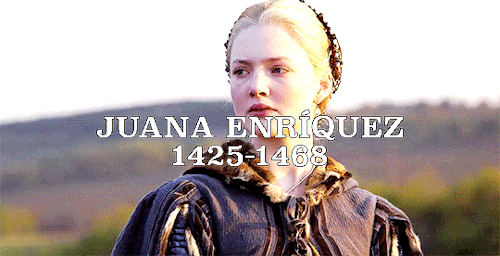latristereina: More about Juana Enríquez But two centuries of rule through lieutenancies
latristereina:More about Juana EnríquezBut two centuries of rule throughlieutenancies had fostered a habit of co-rulership that Juanmaintained. His absences were generally due to military engagementson the Iberian peninsula, so he was close at hand and chose to uselieutenants when the need arose, not regularly or continuously asAlfonso did. Because of his proximity, lieutenants convened orpresided infrequently over sessions of Corts, and thus theyencountered few of the difficulties that Maria faced. Although herelied on his lieutenants—Carles, his wife Juana Enríquez, andlater their son Fernando—he was discerning and cautious. A complexand contradictory man who was loathe to share power, Juan wasinfamous both for his reluctance to work with the Catalan rulingelites and his shabby treatment of his son. Carles and Juan had adeeply problematic relationship owing to the father’s unwillingnessto relinquish his claim to Navarre in favor of his son, and thendisinheriting him in favor of his daughter Leonor, wife of Gaston deFoix. Tensions between father and son worsened when Juan marriedJuana in 1444, and many of the later political problems in the Crownof Aragon can be traced to personal problems in the royal family. Juan’s miserly attitude toward the Catalans and his son did not,however, extend to his second wife. He endowed Juana with similarpowers to those possessed by Maria of Castile, and in many ways shewas truly co-ruler with Juan. Throughout her marriage to Juan she wasone of his closest advisers and most valuable allies, traveling withhim throughout Navarre and the Aragonese realms. Juan relied on herintelligence and discretion, her prodigious familial, financial, andpolitical connections in Castile, and her tenacious and formidablenegotiating skills. In 1451 he appointed her Governor of Navarre withCarles, and the next year she gave birth to Fernando, both of whichfurther deteriorated an already troublesome relationship. In 1458Juan appointed Carles, then thirty-three years old, as LieutenantGeneral in Catalunya, where he proved to be enormously popular. Juanimprisoned him on trumped up charges of treason, and when he died oftuberculosis in September 1461, accusations of foul play surfaced,accusing not only Juan but also Juana of plotting against Carles infavor of her son, Fernando (1452-1514, later Fernando II of Aragón).But Juana was nothing if not intrepid and, no newcomer to politics,she shrugged off the personal attacks and succeeded Carles asLieutenant General. She maintained an extensive court withseparate chancery and treasurer, but without the judicial andlegislative offices that Maria of Castile possessed in parallel withAlfonso’s Neapolitan court. Amid the turbulence and widespreadcivil unrest that erupted in the wake of Carles’s death, shesuppressed opposition in the towns and countryside and securedsupport for her husband and Fernando. In June 1461, she negotiated onbehalf of the Crown to moderate the anti-royalist Capitulations ofVilafranca del Penedés. Like her sister-in-law before her, Juanasided with the remenees, a position that made her highly unpopularwith the city magistrates of Barcelona and the landlords. Unlike thesix Aragonese queen-lieutenants who preceded her, Juana is noted forher active involvement in military actions, notably the earlycampaigns of the ten-year civil war. In June 1462, she and Fernandofled from forces led by the rebellious Count of Pallars and tookrefuge in a royal castle in Girona only to find themselves besiegedfor a month. She organized the defense of the castle and held therebels at bay until Juan and Louis XI of France arrived with militarysupport. Although not personally at the head of an army, she was atough negotiator who rallied and helped organize and provision anarray of forces in defense of the Crown in the Ampurdán, accompaniedforces to Barcelona and into Aragón. She was a key negotiator inthe treaties of Sauveterre and Bayonne in May 1462 that settled thesuccession of Navarre and allowed the French to occupy theterritories of Rousillon and Cerdanya to France in return formilitary support. She was virtually prisoner, with her daughterJuana, in the castle of Lárraga in 1463. Hostilities worsened, theFrench, Castilians, and Portuguese intervened, and periodically theCatalans ‘deposed’ (most notably in 1462) Juan, Fernando(occasionally), and Juana. Her inclusion in this list, although adubious honor, is a clear indication of her power and importance inthe political sphere. After her release from Lárraga and as thecivil war intensified, she turned her attentions to governing Crownrealms as Lieutenant General from 1464 until her death in 1468. With Fernando at her side, and seeking to pacify the warringfactions, she presided over the Cortes of Aragón that met inZaragoza from 1466 to 1468. During this period, she traveledextensively throughout the realms in the midst of civil war,gathering troops and supplies, negotiating with military leaderswhile personally attending to the business of governing—collectingtaxes, holding courts of justice, dealing with the church, managingCrown lands and her own patrimony. The war outlived her by fouryears, but it is fitting that her indefatigable work as co-ruler withher husband and as tutor to her son mark her as the lastqueen-lieutenant of the Crown of Aragon. Theresa Earenfight, Queenship and Political Power in Medieval and Early Modern Spain (Women and Gender in the Early Modern World) -- source link
Tumblr Blog : latristereina.tumblr.com
#history spanish#type gif#user connie

